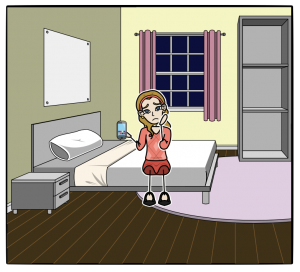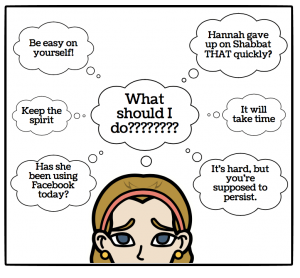Growing up, I always felt stuck between two worlds. My family has always observed Jewish rituals and commandments, and therefore, belonged to a traditional congregation. However, we also identify with the more modern Jewish community’s ideology and warmth, where observance is often less common. While I was partially drawn to Emory because of its active and vibrant Jewish life, I did not consider that, despite the large number of Jews, the observant population would be quite limited.
One of the most central aspects of Jewish observance is the Sabbath, or Shabbat. Friday to Saturday evening marks the Jewish day of rest. For this period of twenty-five hours, acts of creation and work, such as the use of electricity, writing, and driving, are prohibited. Disengaging from these activities can be isolating, and therefore, having a strong community to celebrate Shabbat with is integral to the experience. As my first Shabbat at college approached, I grew concerned about how I would sustain my observance without a community to support me.
I began my Shabbat by attending Hillel, the Foundation for Jewish Campus Life that hosts weekly Shabbat dinner and prayers. With tunes reminiscent of my summer camp and a traditional Friday night meal, this experience certainly gave me the familiar sense of community that I was striving to find. However, as I arrived at my dorm, I immediately returned to my apprehensive state. Twenty-four hours of Shabbat still remained, and I did not know who I would spend them with when everyone was busy binging on Netflix, doing homework, or exploring Atlanta while I was restricted to reading in my bed.
I frantically called my parents, willing to use my phone on Shabbat if it meant gaining some insights and support. “Be easy on yourself,” they told me, and this was not the first time I needed this reminder. “This is a period of adjustment, and you can only do what feels manageable. Give yourself time to find an arrangement that you feel comfortable with.” Until then, they encouraged me to strive to maintain the spirit of the day, even if I found it unsustainable to adhere to all of the legalities.

As my parents spoke, I began engaging in an internal dialogue about my thoughts on the matter. They had been so understanding, but was their approach too generous? I had been observing Shabbat my whole life, and I let it go so easily. Too easily? My failure to practice Shabbat alone must indicate a lack of commitment to Judaism, I judged. And what will my friends and teachers – who invested so much and were so confident in my religious connection – think about this sudden development? Even though I am using my phone, should I resist opening the Facebook app, so my friends do not see that I am active? No matter how much justification I could offer for my personal choices, I could not help feeling ashamed, blaming myself for taking the easy way out, even as I repeated the motto “be easy on yourself” in my head. The dialogue persisted, and I felt little relief.

Even though I did not immediately arrive at a conclusion that I had full confidence in, there was nothing to do but compromise. I spent my day resting, taking a tranquil walk at Lullwater Preserve, and joining a community for a traditional Shabbat lunch. I also settled for a little Netflix watching. Of course, there were still holes in my day, but I felt fairly positive about my approach, despite its limitations.
My experience of this single day spoke to a larger truth about the college transition. I cannot expect it to be effortless, and there will be unforeseen challenges. It will take time to adjust and make choices I feel comfortable with as I gain independence. Sometimes I miss the comfort of spending Shabbat at home, but I know that as I find a way to sustain this practice in college, I will develop true ownership over it, and that will be incredibly meaningful. Isn’t that what college is about?
Prototypes, LLC Clever. “Storyboard Creator | Comic Strip Maker | Graphic Organizer.” Storyboard That, www.storyboardthat.com/storyboard-creator.
